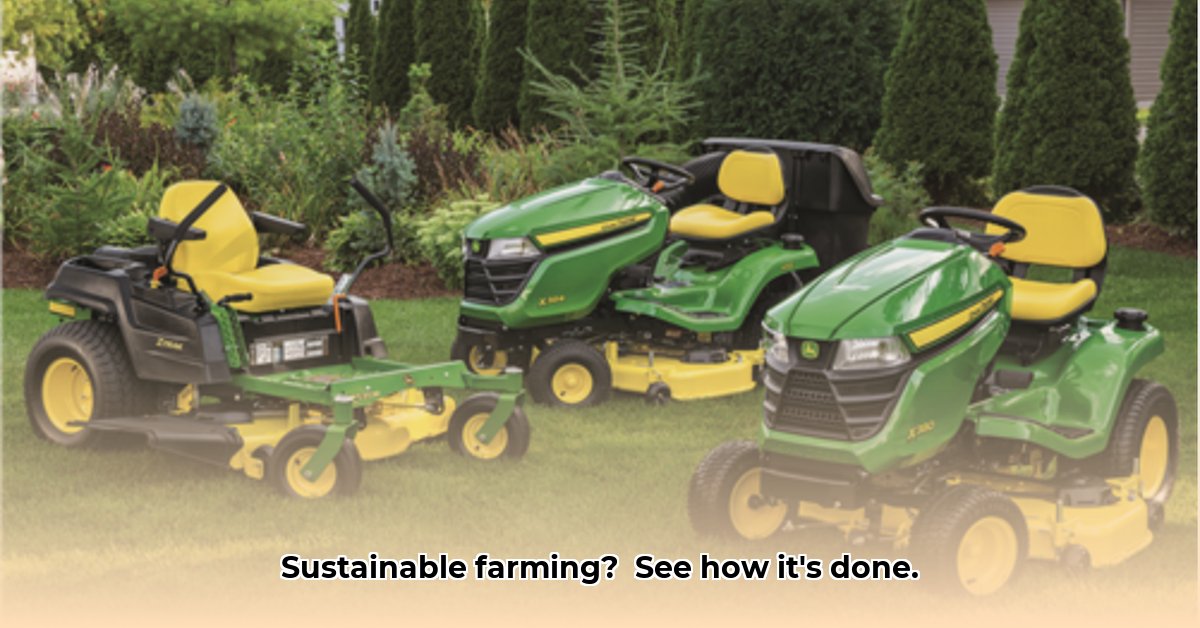
Embracing a Greener Future in Kansas Agriculture
Kansas farmers are increasingly adopting sustainable practices, and the equipment they use plays a crucial role. Heritage Tractor Topeka, a long-standing fixture in the Kansas agricultural landscape, is uniquely positioned to lead this shift towards environmentally responsible farming. For over 25 years, they've served generations of farmers, providing reliable equipment—both new and used. But the demands of modern agriculture extend beyond simply owning bigger tractors. Climate change, consumer demand for sustainable products, and the need for increased efficiency are reshaping the industry. How is Heritage Tractor adapting to this evolving landscape, and what role can they play in helping Kansas farmers thrive sustainably? For more information on Heritage Tractor's Lawrence location, visit their website.
The answer, we believe, lies in their inherent adaptability. Heritage Tractor's history of providing reliable, often used equipment, inherently promotes efficiency. Used equipment emphasizes maximizing value and minimizing waste—a philosophy perfectly aligned with sustainable practices. Less fuel consumption equals reduced emissions, and resource optimization directly translates to environmental responsibility. But adapting to the demands of sustainable agriculture requires more than a shift in perspective; it demands proactive strategic action.
How Heritage Tractor Can Lead the Green Revolution in Kansas
Heritage Tractor has a significant opportunity to become a prominent leader in sustainable agriculture within Kansas. Their success hinges on a comprehensive, multifaceted approach:
Website Revitalization: A modernized online presence featuring a dedicated section on sustainable farming is crucial. This section should showcase equipment reducing fuel consumption, optimizing water usage, and minimizing waste. Real-world case studies and clear examples demonstrate the tangible benefits for farmers. This would directly address the current lack of online emphasis on this critical aspect.
Community Engagement: Cultivating partnerships with local agricultural organizations focused on sustainability is vital. This collaboration could manifest in workshops, demonstrations, and farmer-to-farmer discussions. This direct interaction builds trust and positions Heritage Tractor as an invaluable resource within the community. Isn't community engagement the cornerstone of any successful business strategy?
Strategic Alliances: Collaborating with manufacturers renowned for their eco-friendly equipment significantly expands product offerings. This will appeal to a broader base of farmers seeking sustainable solutions, diversifying Heritage Tractor's offerings and solidifying their position in the market. This strategic move provides a clear path to expansion and brand enhancement.
Comprehensive Staff Training: Equipping the sales and service teams with the knowledge and confidence to effectively advise farmers on sustainable equipment and practices is paramount. Well-informed staff translates to superior customer service and increased brand loyalty. Isn't informed staff the key to successful customer engagement?
Sustainable Farming Equipment: A Closer Look
While some dismiss sustainable farming as a fleeting trend, many experts see it as a necessary shift. The initial challenges of adopting sustainable practices often yield long-term profitability and environmental responsibility. These two aspects are not mutually exclusive; they often work in tandem.
| Equipment Type | Sustainability Benefits | Potential Challenges |
|---|---|---|
| Precision Planting Systems | Optimized seed and fertilizer use; higher yields, less waste | Higher upfront cost; technology dependence |
| Low-Emission Tractors | Reduced greenhouse gas emissions; cleaner air | Higher purchase price; limited model availability |
| Water-Efficient Irrigation | Conserves water resources; improved drought resilience | Requires specialized infrastructure; potential cost increases |
The Future of Kansas Agriculture: A Sustainable Path Forward
The shift towards sustainable practices represents the future of Kansas farming. Heritage Tractor Topeka, with its established presence and legacy, is uniquely poised to lead this transformation. By consciously embracing these sustainable practices, Heritage Tractor safeguards its own long-term viability while simultaneously contributing to a more environmentally responsible and economically viable agricultural landscape in Kansas. The opportunity is clear; the potential benefits are immense. Will Heritage Tractor seize this moment? The potential for positive change is undeniable.
Finding Sustainable Farming Equipment Near Topeka, Kansas
Finding sustainable farming equipment near Topeka demands a comprehensive approach. Utilizing local dealers, online platforms, agricultural events, and government resources all contribute to a successful search. Understanding one's specific farming needs is paramount before making any procurement decisions.
Local Dealerships: Your First Stop
Begin your search by visiting local agricultural equipment dealers. Heritage Tractor Topeka, with its history of service, is an excellent starting point. While not all equipment may be explicitly labeled “sustainable,” many modern machines offer fuel efficiency, precision technologies minimizing waste, and other sustainability-focused features. Engage with sales representatives, clearly articulating your farming objectives to find the perfect fit.
Harnessing the Power of the Internet
Online marketplaces specializing in used agricultural machinery often list sustainable equipment. Targeted searches for terms like "no-till drill Kansas," "precision planter Topeka," or "used sustainable farming equipment" can yield many results. However, always verify sellers' ratings and meticulously inspect any equipment before purchasing.
Agricultural Events and Trade Shows: Connecting With the Community
Attending agricultural events and trade shows offers a valuable opportunity for direct interaction with manufacturers and other farmers. This face-to-face networking enables you to see equipment firsthand, learn about the latest innovations in sustainable agriculture, and receive valuable advice.
Government Resources and Subsidies: Exploring Financial Assistance
Various government agencies often provide subsidies and incentives for farmers adopting sustainable practices. Investigating these resources, such as the USDA and the Kansas Department of Agriculture, can significantly impact the affordability of sustainable equipment.
Needs Assessment: Prioritizing Your Farming Goals
Before initiating your search, carefully assess your farm's specific needs. Determine your requirements for practices like no-till farming or precision planting to ensure you invest in equipment delivering the desired sustainable outcomes.
Comparing Costs and Benefits: A Long-Term Perspective
Sustainable farming equipment often involves a significant upfront investment. Carefully compare the initial costs against long-term benefits, such as yield increases, reduced input costs, and environmental advantages. Explore leasing options or consider equipment-sharing arrangements with fellow farmers to mitigate costs effectively.